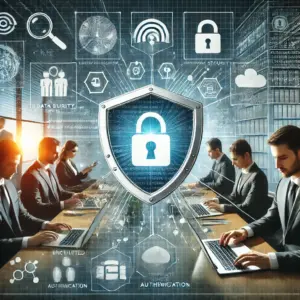Tech Tips
Remote Work Security: Professional Services Firms’ Guide to Protected Collaboration
The shift to remote work has fundamentally transformed how professional services firms operate, bringing both unprecedented opportunities and significant security challenges. For law firms, accounting practices, and consultancies, protecting sensitive client data while enabling seamless collaboration has become mission-critical.
The Hidden Costs of DIY Security Management
Many professional services firms initially attempt to handle their IT security in-house, often discovering that this approach creates more problems than it solves. Between keeping up with evolving cyber threats, managing compliance requirements, and supporting remote teams, internal IT resources quickly become overwhelmed.

Consider this: A mid-sized law firm recently spent over $150,000 recovering from a ransomware attack that originated through an unsecured remote desktop connection. The breach could have been prevented with proper managed IT solutions for professional services.
Why Traditional Security Measures Fall Short
The Complexity Challenge
Remote work environments have created a web of potential vulnerabilities:
- Personal devices accessing company resources without proper security protocols often create backdoors for cybercriminals. These unmanaged devices may lack crucial security updates or harbor malicious software that could compromise your entire network.
- Unsecured home networks handling sensitive client data pose significant risks, as these networks typically lack enterprise-grade firewalls and intrusion detection systems that protect office environments.
- Team members using unauthorized collaboration tools can inadvertently expose confidential information through unsanctioned cloud services or file-sharing platforms that don’t meet compliance requirements.
- Inconsistent backup and recovery procedures across remote locations can lead to data loss or make it impossible to recover from a security incident efficiently.
The Human Factor
Even well-intentioned employees can inadvertently create security risks. Working from home often blurs the lines between professional and personal technology use, leading to potential data exposure. Studies show that 82% of data breaches involve human error, making comprehensive security training essential.
Building a Robust Remote Security Framework
Assessment and Strategy
Professional services firms need a comprehensive security strategy that addresses:
- Data classification and protection requirements based on sensitivity levels and regulatory obligations
- Remote access protocols and authentication methods that balance security with usability
- Compliance with industry-specific regulations such as HIPAA, GDPR, or financial services requirements
- Business continuity and disaster recovery planning that accounts for distributed workforce scenarios
Essential Security Components
1. Identity and Access Management
Implementing strong authentication methods ensures only authorized personnel can access sensitive information. This includes:
- Multi-factor authentication using biometrics, hardware tokens, or authenticator apps
- Role-based access control that limits exposure to sensitive data based on job requirements
- Single sign-on solutions that improve security while reducing password fatigue
- Regular access reviews and updates to maintain the principle of least privilege
2. Endpoint Protection
With team members working from various locations, endpoint security becomes crucial:
- Advanced threat protection using AI-powered tools to detect and prevent sophisticated attacks
- Device encryption to protect data even if hardware is lost or stolen
- Mobile device management enabling remote wiping of compromised devices
- Automated security updates ensuring all endpoints maintain current protection
The Value of Managed IT Services
Proactive Security Management
Working with a managed IT service provider in the Bay Area, for instance, offers several advantages:
- 24/7 monitoring and threat detection using advanced security information and event management (SIEM) systems
- Regular security assessments and updates to address emerging threats
- Automated patch management across all devices and applications
- Rapid incident response capabilities with defined escalation procedures
Compliance and Documentation
Professional services firms must maintain detailed records of their security measures. Managed service providers help by:
- Maintaining audit trails of all security-related activities and access attempts
- Documenting security procedures and incident response plans
- Updating compliance requirements as regulations evolve
- Providing regular security reports and compliance attestations
Real-World Implementation Success
A recent case study demonstrates the power of professional IT management: An accounting firm with 50 remote employees implemented a managed security solution that included advanced endpoint protection, secure cloud storage, and comprehensive staff training. The result? A 60% reduction in security incidents and complete elimination of data breaches over an 18-month period.
Such success stories often hinge on robust device management strategies that extend security policies to every endpoint. For many organizations, leveraging unified endpoint management platforms like Microsoft Intune is key to achieving this level of control and compliance. Intune provides comprehensive capabilities for managing diverse devices, ensuring data protection, and enforcing security policies across remote workforces. Expert assistance can help organizations Deploy Microsoft Intune effectively, tailoring it to their specific operational needs and stringent security requirements. This proactive approach minimizes vulnerabilities and strengthens the overall security posture.
Making the Transition
Selecting the Right Partner
When choosing a managed IT service provider, consider:
- Industry-specific experience working with similar professional services firms
- Compliance expertise in relevant regulatory frameworks
- Support availability and response time guarantees
- Strategic planning capabilities for long-term security improvements
Implementation and Training
A successful security program requires:
- Comprehensive employee training with regular updates and refresher courses
- Clear security policies that address remote work scenarios
- Regular updates and reviews of security measures
- Ongoing support and guidance for all team members
The Bottom Line
The complexity of managing remote work security while maintaining productivity demands expertise and resources that many professional services firms lack internally. By partnering with a managed IT service provider, firms can focus on their core business while ensuring their remote work environment remains secure and compliant.
Remember: In today’s remote work landscape, robust security isn’t just about protection – it’s about maintaining client trust and ensuring business continuity. Professional services firms that prioritize security through managed IT partnerships position themselves for sustainable growth and success in an increasingly digital world.





